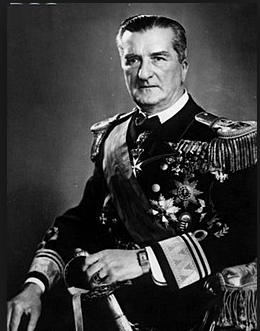
Miklós Horthy Regent of Hungary 1920-1944
Purpose of the webpage: to introduce Miklós Horthy, the man, both in the interwar period and during the Second World War, to give a strict, fact-based interpretation of events in Hungary in this period.
Our intention is to introduce Miklós Horthy, a member of the Hungarian landed gentry, born in the middle of the essentially feudal nineteenth century, whose horizons were broadened beyond those of his rural peers because he became a student at the Naval Academy in Fiume and later a naval officer. As ADC to Emperor Franz Joseph he could see, from the inside, the mechanisms of empire. Both this experience and his heritage fed into his decision making as Regent. The intention of this webpage is not to fuel existing debate but to find the man behind the decisions. We would like to see the person behind the myths.
Key Dates
1868, 18th June / Birth of Miklos Horthy in Kenderes
1882 / Horthy joins the Austro-Hungarian navy
1889, November / He becomes ship-of-the-line lieutenant in the Austro-Hungarian navy
1901, 22nd July / Marrys Magdolnó Purgly of Jószás
1909 / Miklos Horthy becomes Aide-de-camp to Franz Josef in Vienna
1918, 1st March / Miklos Horthy becomes the Chief Commandant and an Admiral of the Austro-Hungarian fleet
1918, 17th October / Hungary proclaims its independence
1918, 11th November / End of First World War
Entering the War
Following the bombing of Kassa on the 26th June 1941 Hungary declared war on the Soviet Union. There is still no satisfactory answer to the question of who launched this attack. Nor can our Webpage give a certain answer to this, however we will try to give you a clearer picture by explaining who it is believed was not responsible. A day after the beginning of Operation Barbarossa, on the 22nd June 1942, József Kristóffy, Hungarian Ambassador in Moscow, sent the following telegram to the foreign ministry in Budapest ‘Molotov summoned me this morning. He asked me about the position of Hungary in the current German-Soviet conflict and informed me that the Soviet government, as previously declared has no claim or hostile intention towards Hungary.
Hungarian attempts to change sides
On the 23rd August Romania changed sides in the war putting Hungary into an awkward situation with the Soviet army already on its eastern borders. Because of its sympathy to Nazi Germany the Regent decided immediately to dismiss the Sztójay government and appointed a new cabinet under the leadership of Major General Géza Lakatos on that day with the task of leading the country out from the war. But the new government feared taking this step against the Reich and refused to vote for a peace agreement with the Allies. Despite this setback, on the 7th September Horthy convened a meeting of the Crown Council and ordered the government to start peace negotiations.
Horthy, perhaps mistakenly believing the military were most loyal to his leadership, didn’t risk challenging the Germans with a further change in government and Prime Minister Lakatos and his ministers remained in office.